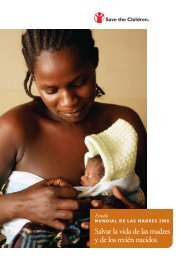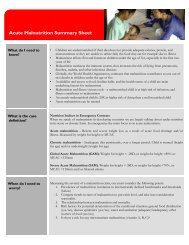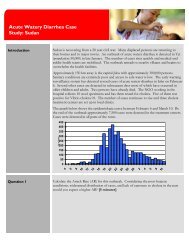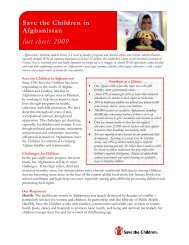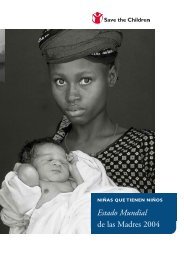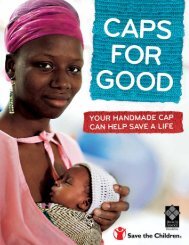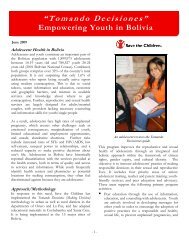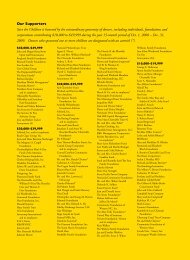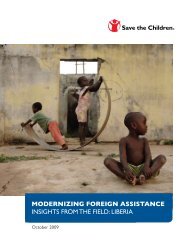Annual Report 2002 - Save the Children
Annual Report 2002 - Save the Children
Annual Report 2002 - Save the Children
You also want an ePaper? Increase the reach of your titles
YUMPU automatically turns print PDFs into web optimized ePapers that Google loves.
Uganda<br />
Community-based<br />
education for<br />
both boys and girls<br />
who would o<strong>the</strong>rwise<br />
not have access<br />
to formal schooling<br />
is a central goal of<br />
<strong>the</strong> Strong<br />
Beginnings<br />
program.<br />
Vietnam<br />
Families learn<br />
toge<strong>the</strong>r about<br />
child health and<br />
development so<br />
<strong>the</strong>y can give <strong>the</strong>ir<br />
children <strong>the</strong> best<br />
start when <strong>the</strong>y<br />
enter school.<br />
school days and a shorter, more flexible school year that<br />
accommodates local needs and lifestyles. Because of high<br />
demand, <strong>Save</strong> <strong>the</strong> <strong>Children</strong> is currently expanding <strong>the</strong><br />
project to neighboring districts and is incorporating health<br />
and nutrition education into <strong>the</strong> curriculum.<br />
Making Girls’ Education a Priority<br />
Female literacy and basic education are essential for a<br />
woman’s health, economic success and <strong>the</strong> increased<br />
survival of her children, yet of <strong>the</strong> world’s 125 million<br />
children who are not in school, roughly two-thirds are<br />
girls. The reasons are cultural, economic and, sometimes,<br />
political, so <strong>Save</strong> <strong>the</strong> <strong>Children</strong>’s innovative education<br />
strategies are designed to address<br />
<strong>the</strong>se specific issues.<br />
One way this is accomplished<br />
is through <strong>the</strong> Village<br />
Schools program, in which school<br />
days and sessions are scheduled<br />
around <strong>the</strong> daily and seasonal<br />
chores that typically are expected<br />
of young girls so <strong>the</strong>y can help<br />
take care of <strong>the</strong>ir families. In<br />
Malawi alone, <strong>Save</strong> <strong>the</strong> <strong>Children</strong><br />
has expanded this most successful<br />
program to 455 communities,<br />
reaching 336,000 children.<br />
In countries like Ethiopia<br />
and Afghanistan, where <strong>the</strong><br />
culture prohibits girls from<br />
traveling far from home, <strong>Save</strong> <strong>the</strong><br />
<strong>Children</strong> has helped communities<br />
set up schools in <strong>the</strong> homes of<br />
volunteer families, where <strong>the</strong> girls can receive a full basic<br />
education that respects local customs.<br />
The indigenous Mayan population of Guatemala has<br />
been severely marginalized and impoverished after 40 years<br />
of brutal civil war, and <strong>the</strong> illiteracy rate among Mayan<br />
women is as high as 80 percent. <strong>Save</strong> <strong>the</strong> <strong>Children</strong>’s<br />
Integrated Community Literacy approach not only teaches<br />
<strong>the</strong>m to read and write, but also helps with <strong>the</strong> knowledge<br />
and skills <strong>the</strong>y need to gain social confidence and become<br />
active community leaders.<br />
Keeping Literacy Alive<br />
The Bangladesh Reading for <strong>Children</strong> program began<br />
among participants who belonged to a group that fostered<br />
small business development for women. However after a<br />
while, <strong>the</strong> women met less often and <strong>the</strong>ir literacy skills<br />
began to deteriorate rapidly. <strong>Save</strong> <strong>the</strong> <strong>Children</strong> helped<br />
<strong>the</strong>m to regain and maintain <strong>the</strong>ir literacy, and cultivate<br />
<strong>the</strong>ir children’s interest in reading at <strong>the</strong> same time, by<br />
encouraging <strong>the</strong>se mo<strong>the</strong>rs to form groups to read to <strong>the</strong>ir<br />
children. This inspired <strong>the</strong> mo<strong>the</strong>rs to develop a series of<br />
children’s books in Bengali, drawing on local talent and<br />
folk tales, and even to create a mobile library to reach<br />
surrounding communities and people of all ages.<br />
PROVIDING WOMEN WITH ECONOMIC<br />
OPPORTUNITIES<br />
Of <strong>the</strong> world’s 1.3 billion people living on less than one<br />
dollar a day, two-thirds are women. And although women<br />
bear <strong>the</strong> primary responsibility for <strong>the</strong>ir children’s wellbeing<br />
and education, <strong>the</strong>ir low social and economic status<br />
in many societies does not provide opportunities for<br />
improving <strong>the</strong>ir lot.<br />
SAVE THE CHILDREN 11



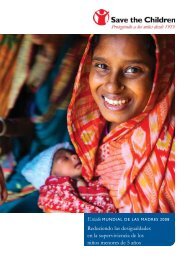
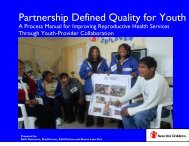
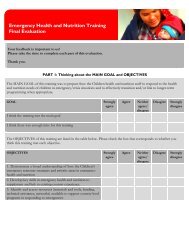
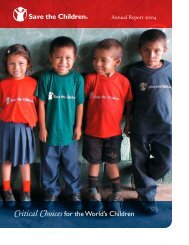
![View full document [PDF 3.39 MB] - PreventionWeb](https://img.yumpu.com/27308954/1/190x245/view-full-document-pdf-339-mb-preventionweb.jpg?quality=85)
